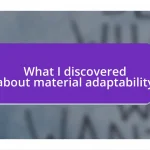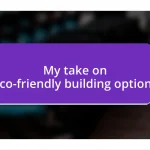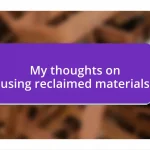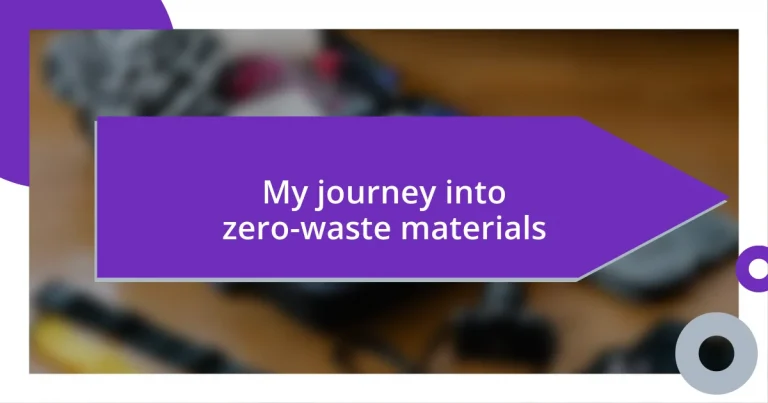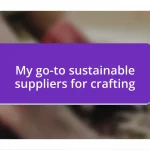Key takeaways:
- Understanding zero-waste principles involves adopting a lifestyle that emphasizes the “five R’s”: refuse, reduce, reuse, recycle, and rot.
- Switching to zero-waste materials leads to significant waste reduction, supports local economies, and fosters mindfulness about consumption.
- Creating a zero-waste home includes practices like bulk shopping, a “buy nothing” mindset, and community engagement for shared learning and support.
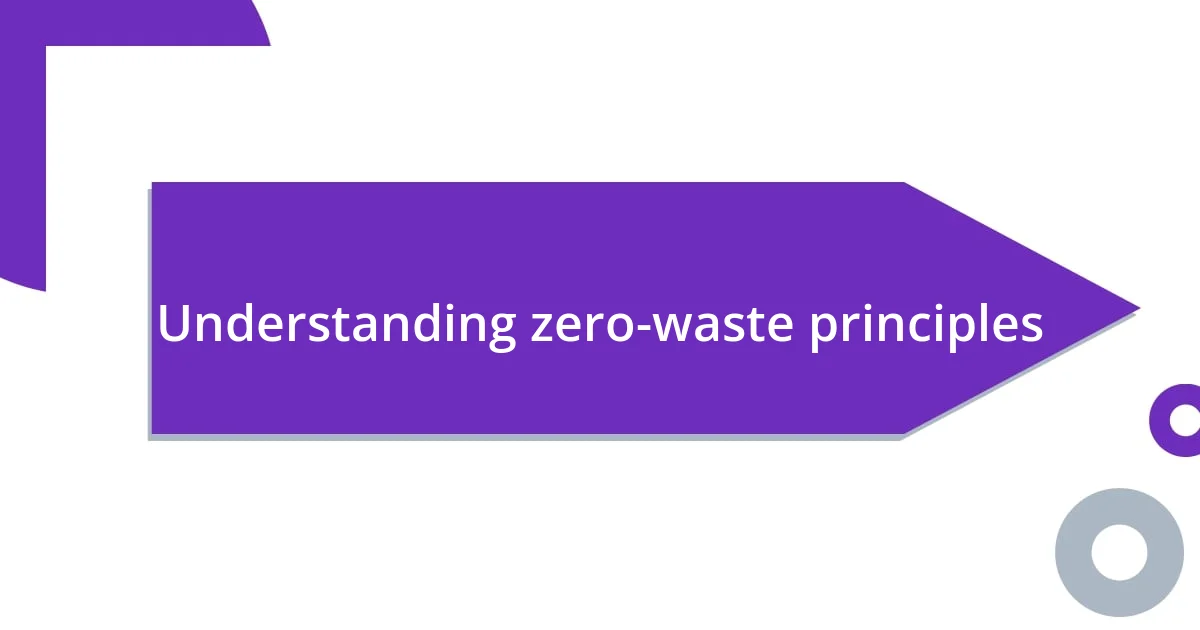
Understanding zero-waste principles
Zero-waste principles revolve around the idea of minimizing waste by designing products and systems that keep resources in use for as long as possible. From my experience, adopting this mindset transformed how I view simple, everyday items. Have you ever felt that twinge of guilt when tossing something in the trash? It’s remarkable how shifting my focus to what can be reused or recycled has not only reduced my waste but also helped me appreciate the value of materials.
I still remember the day I learned about the “five R’s” of zero waste: refuse, reduce, reuse, recycle, and rot. The concept struck a chord with me because it emphasizes not just recycling, but a complete shift in lifestyle. For instance, instead of buying new jars for storage, I now collect and repurpose old ones, turning them into beautiful containers instead of clutter. Isn’t it incredible how a small change in perspective can lead to creative solutions?
Understanding zero-waste principles is about recognizing the life cycle of products and finding ways to extend their purpose in our lives. I often ponder the impact of my choices—how can a single action ripple out to create a broader change? It’s empowering to know that by choosing sustainably sourced materials or supporting local businesses, I contribute to a healthier planet and a more thoughtful way of living. What steps can you take today to embrace this transformative journey?
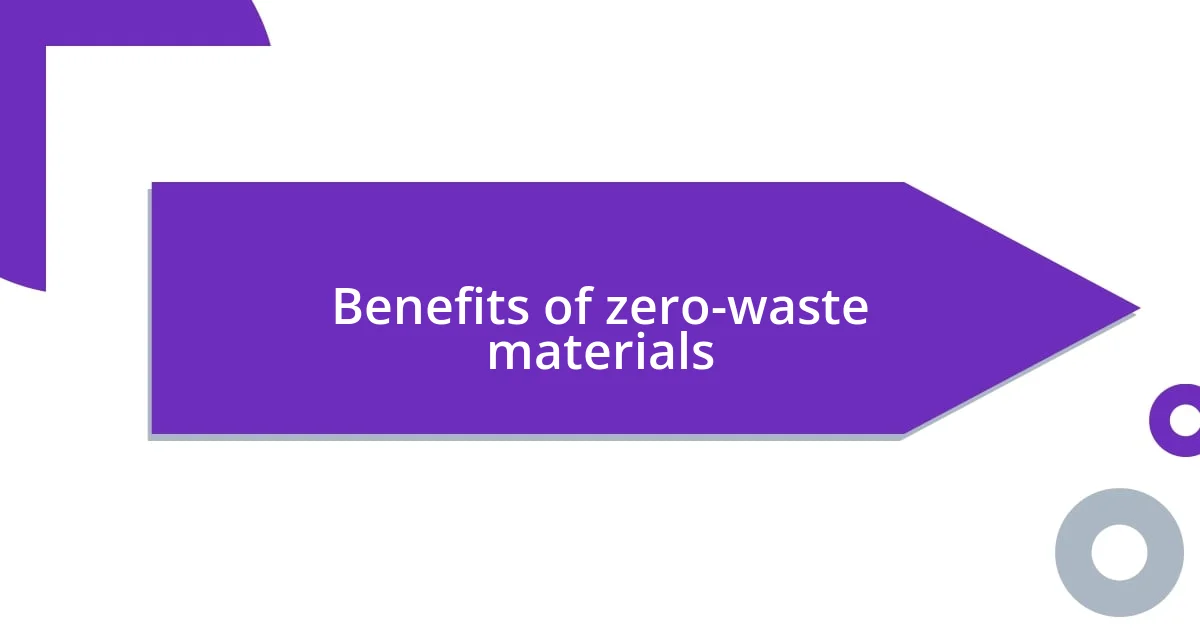
Benefits of zero-waste materials
The benefits of zero-waste materials are both practical and profound. Personally, I’ve experienced a significant reduction in my household waste just by switching to items that are reusable or compostable. It gives me a sense of fulfillment knowing that each conscious choice directly contributes to a cleaner environment. Have you ever noticed how small changes can lead to big impacts?
Beyond reducing waste, zero-waste materials often promote sustainable manufacturing practices. I was pleasantly surprised to learn that many of these products are made from recycled or renewable resources, which not only minimizes environmental harm but often supports local economies. I can connect the dots between the product I purchase and its broader implications on climate change and my community. It’s like being part of a larger movement that genuinely aims to make a difference.
Additionally, using zero-waste materials fosters a deeper appreciation for the things we own. I’ve found that when I invest in high-quality, sustainable items, I care for them more and choose to repair rather than replace. This shift has sparked a newfound joy in my possessions, turning routine activities like cooking or crafting into moments of mindfulness and creativity. Doesn’t it feel great to embrace a lifestyle that values sustainability?
| Benefit | Description |
|---|---|
| Waste Reduction | Less landfill waste and lower environmental impact. |
| Support for Local Economies | Often, zero-waste products are sourced from local businesses, helping stimulate the economy. |
| Increased Mindfulness | Encourages thoughtful consumption and appreciation for durable goods. |
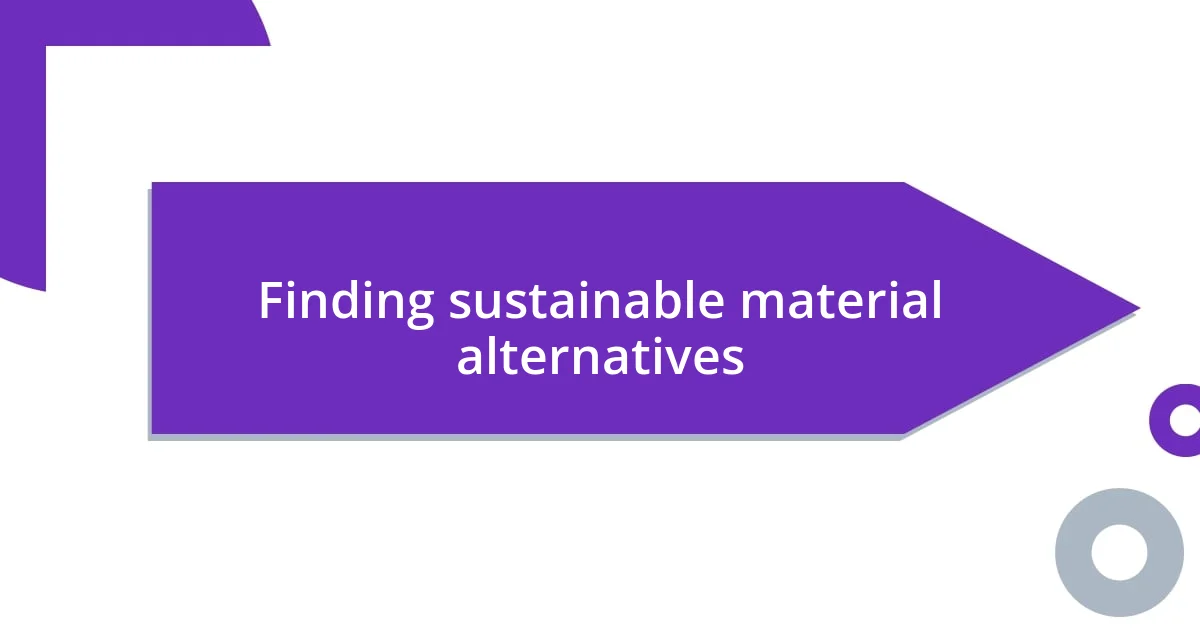
Finding sustainable material alternatives
Finding sustainable alternatives has been a transformative aspect of my zero-waste journey. I vividly remember my first attempt at swapping out typical products for green options. I stumbled upon bamboo toothbrushes and reusable beeswax wraps and felt a rush of excitement; it was as if I had uncovered a secret club of eco-conscious consumers. Since then, I have embraced the thrill of discovering materials that not only serve a purpose but also align with my values.
Here are a few sustainable material alternatives I’ve found helpful:
- Bamboo: An incredibly versatile plant that’s biodegradable and faster-growing than trees.
- Recycled paper: Perfect for packaging or crafts, keeping waste out of landfills.
- Hemp: Durable and biodegradable, ideal for textiles and ropes.
- Glass: A reusable and recyclable option for storage, reducing reliance on plastic.
- Cork: Harvested sustainably, it works wonderfully as a renewable flooring material and for coasters.
With every alternative I explore, I feel more connected to the earth and my community. It’s rewarding to think that every small choice leads to a ripple effect. Have you started to explore these options in your own life?
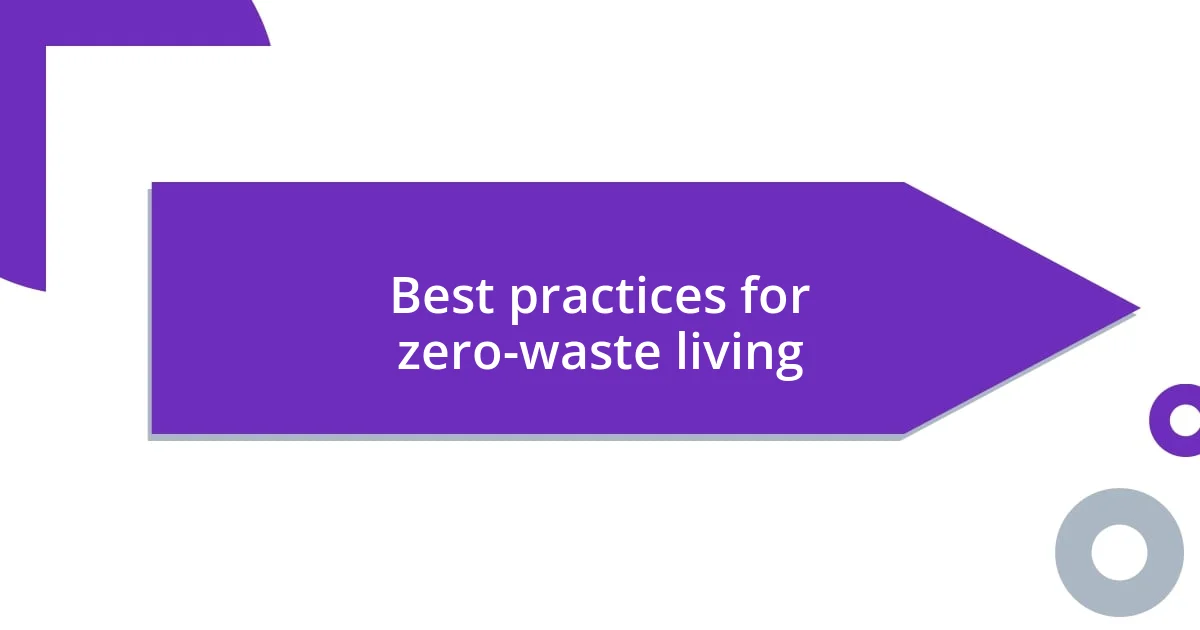
Best practices for zero-waste living
One of the best practices for zero-waste living that I’ve adopted is to always carry reusable bags with me. I remember the first time I went grocery shopping without a plastic bag. I felt a tinge of anxiety, but also excitement, as I put my vegetables straight into my tote. It was a small yet empowering moment, one that reminded me to be accountable for my choices. Have you ever felt that rush when you make a conscious effort to say no to single-use items?
Another essential practice is to embrace DIY solutions whenever possible. Creating my own cleaning products from simple ingredients like vinegar and baking soda has not only cut down on waste but also minimized my exposure to harsh chemicals. The first time I used my homemade cleaner, I couldn’t believe how effective it was! It’s an enjoyable process that encourages creativity and resourcefulness. Have you tried making things from scratch, and how did that shape your perception of waste?
Incorporating a composting system is a game-changer for anyone serious about going zero waste. I found that starting a backyard compost has enriched my garden soil and allowed me to reduce food waste significantly. At first, I hesitated—could I really keep track of what can and can’t go into the pile? But now, turning kitchen scraps into nutrient-rich compost feels like a rewarding victory. How about you? Have you started composting, and what challenges have you encountered along the way?
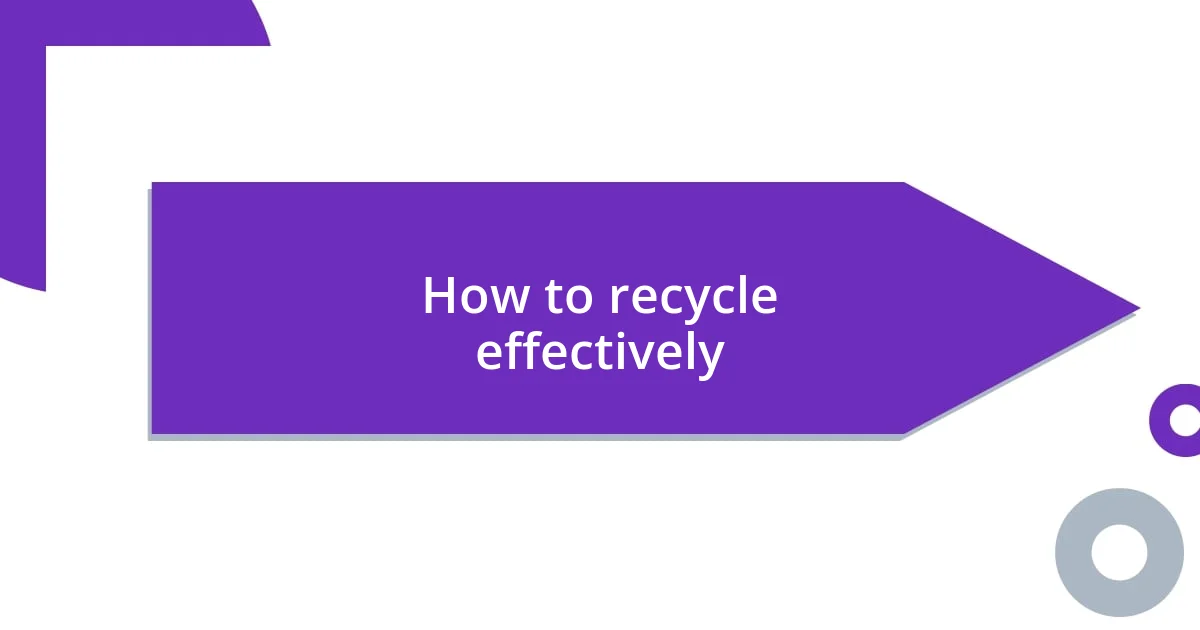
How to recycle effectively
When it comes to recycling effectively, I’ve learned that it starts with understanding what can and cannot be recycled in my local area. I remember feeling overwhelmed by the variety of materials, but I quickly discovered my city’s guidelines through a simple online search. It was an eye-opener! Have you ever felt confused about where to toss your recyclables? Knowing this not only empowers me but also helps reduce contamination in the recycling stream.
Another key aspect is preparing items for recycling properly. I can’t stress enough how important it is to rinse out containers before tossing them in the bin. I made the mistake of neglecting this once, and I watched my local recycling program reject an entire batch because of dirty pizza boxes. The frustration was palpable! Have you had a similar experience that made you rethink your recycling habits?
Lastly, I’ve found that keeping my recycling bin visible and accessible encourages me to recycle consistently. For instance, I dedicated a spot in my kitchen specifically for cans and bottles. Every time I see that bin filling up, I feel a sense of accomplishment! What simple changes have you implemented to make recycling a part of your daily routine? Each small step adds up, creating a more sustainable future.
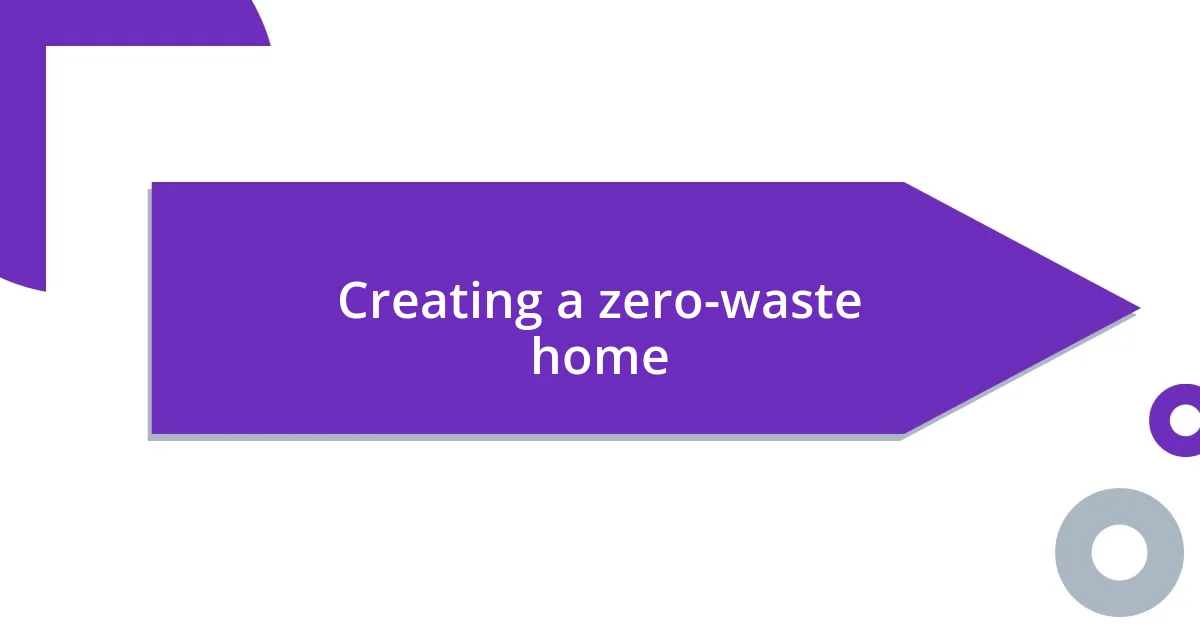
Creating a zero-waste home
Creating a zero-waste home is an intentional journey that requires mindfulness and creativity. One of my favorite strategies has been to implement a “buy nothing” mindset for things I don’t need. I recall a time when I resisted the urge to purchase a trendy gadget, reminding myself that my home was already filled with perfectly functioning items. It felt liberating to say no to excess, and I realized how quickly desires can shift when you focus on what you truly value. Have you ever challenged yourself to skip a purchase and found unexpected joy in what you already own?
In my quest for a zero-waste lifestyle, I’ve also transformed the way I shop for food. Whenever possible, I opt for bulk bins at my local grocery store. I still remember my first trip to the bulk section; it felt like an adventure, exploring various grains and nuts, all while bypassing plastic packaging. Plus, bringing my own jars felt like a small act of rebellion against wastefulness. It turned shopping into a purposeful experience—what’s more satisfying than knowing you’re supporting sustainability while satisfying your hunger?
Lastly, I’ve discovered the importance of creating a community focused on reducing waste. Joining local groups, both online and in person, has provided me with invaluable connections and ideas. I think back to the first workshop I attended on upcycling materials; the enthusiasm in the room was contagious! Listening to others share their stories and challenges brought a sense of camaraderie that made the journey feel less daunting. Have you ever gotten inspired by a community effort, and how did it influence your approach to living more sustainably?
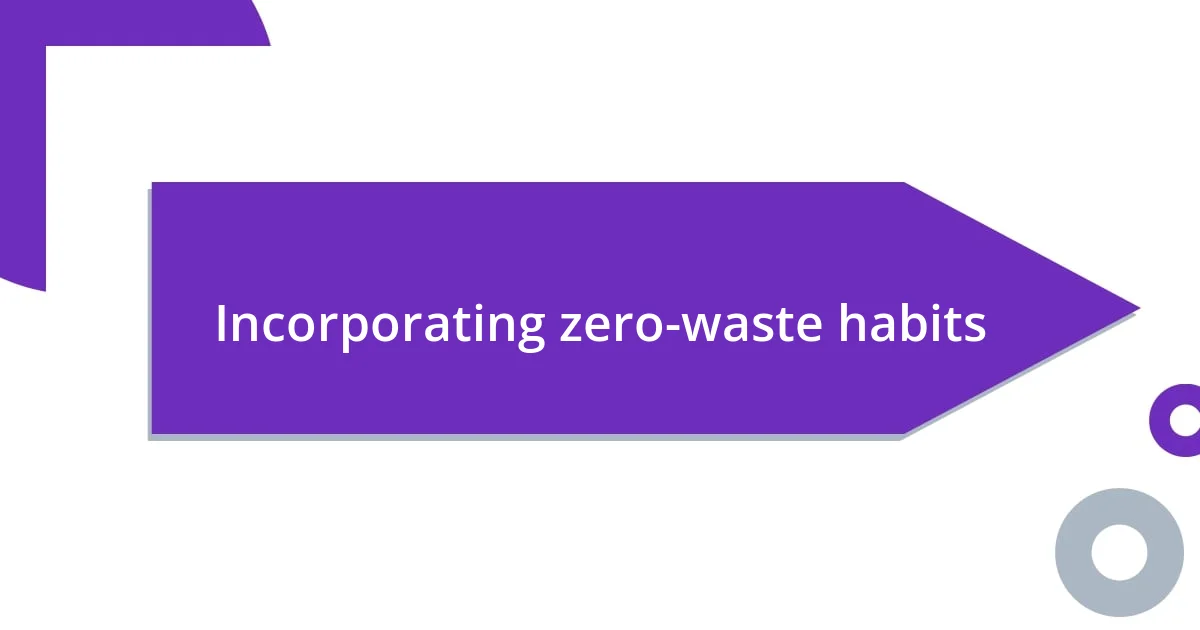
Incorporating zero-waste habits
Incorporating zero-waste habits into my daily life hasn’t just been an adjustment; it’s felt like a transformation. One simple change I started with was carrying a reusable bag everywhere I went. I vividly remember the first time I resisted the impulse to snag a single-use plastic bag for my groceries. That small act of remembering to bring my bag felt empowering, like I was taking a stand against waste. Have you ever thought about how something so simple can create a ripple effect in your habits?
A significant aspect of my zero-waste journey has been getting creative with what I already have. I found myself rethinking old items rather than tossing them aside. For example, I used an old glass jar to store loose herbs instead of buying a new container. It was surprisingly satisfying to repurpose something destined for the recycling bin into something functional. Have you ever discovered new uses for items you thought were useless?
Lastly, I believe in the power of mindful consumption. It’s not just about what I buy, but how I approach purchases overall. I now embrace the 30-day rule; if I want something new, I wait a month before making a decision. This waiting period has saved me from countless impulse buys, and I’ve often realized that the desire fades over time. It’s a lesson in patience and intention, and I encourage you to consider what you truly need before making that next purchase. What habits have you adopted to ensure you’re consuming mindfully?



